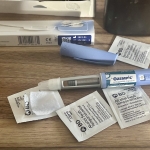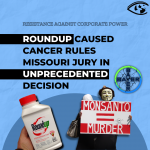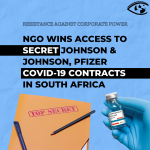USA: Hormonal Outrage at Pharmaceuticals
You'd think she'd be happy. After more than 15 years of challenging the dogma that all women need hormone replacement to prevent heart disease and bone breaks after menopause, Maryann Napoli has been vindicated.
Last week, after its findings revealed that the combination of hormones taken by some 6 million women was doing more harm than good, causing an increase in heart attacks, breast cancer, blood clots, and strokes, a national study was halted mid-stream. Wyeth, which has raked in more than $2 billion a year from its top-selling hormone therapies -- and received its share of precisely worded, critical letters from Napoli over the years -- is now watching its stock price dive.
Doctors who once eagerly prescribed the treatment are admitting their error. Yet Napoli, associate director of the Center for Medical Consumers in Manhattan and one of a handful of women's health advocates who have tirelessly played David to the hormonal establishment's Goliath, seems a little sad.
"I just wish there had been more caution about giving women this drug combination in the first place," she says, looking up at the shoes passing by the window of her tiny, donated office space in a West Village basement. Instead, "they turned a stage of life into a disease for which you're supposed to take drugs every day for the rest of your life," she says. "It was a pharmaceutical industry's dream come true."
For many women, though, the treatment of menopause has been a nightmare. Greed and misogyny dovetailed in a massive marketing campaign for products that turned out to be both dangerous and unnecessary. Introduced more than 50 years ago as a remedy for hot flashes and other irritations of menopause, estrogen therapy (to which another hormone, progesterone, was later added) was subsequently promoted as a way for women to remain youthful and sexy. In "Forever Feminine," a 1965 book funded by Wyeth-Ayerst (the precursor of Wyeth), the pills were touted as a way of keeping women's breasts and genitals from shriveling.
In recent years, the ageism and sexism driving the push for hormones grew more insidious, as the desire to "correct" women's bodies was couched in scientific terms. Though hormone therapy's effect on the heart was unclear (and is now known to be harmful), aggressive, multi-layered marketing campaigns convinced many doctors to recommend hormones to prevent heart disease even in healthy patients. As a result, for the better part the last decade, Wyeth's estrogen pill Premarin has been the bestselling drug in the country.
"A lot of [doctors] actually believed that estrogen prevents heart disease," says Cindy Pearson, executive director of the National Women's Health Network, a Washington, D.C.-based nonprofit that published "The Truth About Hormone Replacement Therapy." "They read review articles and didn't realize that the author had accepted a fee. They went to conferences and didn't realize that the drug companies had inserted slides into presenters' talks. Some doctors got continuing education materials funded by drug companies that make unproven claims."
For activists, the struggle over hormone replacement came to epitomize the power of pharmaceutical interests to steamroll patients' concerns. As one might expect in a battle with billions at stake, those who challenged that consensus were marginalized. In her basement office, Maryann Napoli quietly pored over the journal articles, circling the unsubstantiated claims in hormone ads and firing off letters to the drug companies, many of which went unanswered. She fielded phone calls from women across the country who were made to feel like outlaws for questioning the treatment.
Barbara Seaman, author of the 1977 book "Women and the Crisis in Sex Hormones," found her work increasingly unwelcome in mainstream publications as she became more outspoken about the issue. And the National Women's Health Network's Pearson attended countless medical and pharmaceutical meetings -- though she was rarely invited.
"We almost never were asked to speak," says Pearson. "At women's conferences, yes, but not at the big Washington meetings. I can't tell you how many times I've sat on the aisle as close to the open mic as possible so I can jump up just before the last speaker stops. I've even approached female doctors in the women's room."
If the activists' urgency sprouted from the feminist conviction that women deserve to be heard, their message was scientific: The proof that hormone replacement prevented heart disease was too weak to support the routine promotion of the drugs, they argued, and the long-term effects were still unknown. Their prodding was partly responsible for the study that showed them to be right. In an article in the July 10 issue of the Journal of the American Medical Association, the national study's researchers reported that heart attacks and other "coronary events" went up 29 percent in women on the drug combination compared to those taking placebos; they also had twice the rate of blood clots in the lung and 26 percent more breast cancer.
Which is why the victory is bittersweet. For Maryann Napoli, the should-I-take-estrogen inquiries have been almost instantly replaced by worried calls "from women who have breast cancer and want to know if they got it from the hormones," she reports. She can't answer that question -- no one can -- but Napoli does have one hopeful message for patients everywhere: "We should all be skeptical of the next thing they try to sell us in a big way."
Even that seemingly obvious lesson may be difficult to retain amid the power flow of messages from profit-driven companies. "Though their product is dangerous, the drug companies still have all the resources . . . to cloud the issue," says Pearson. "On the day the news broke, they had two of their people stationed at the doors of the National Press Club offering industry experts. At the Network, we're still just five people with three phone lines and one photocopier."
Sharon Lerner is a contributing writer for the Village Voice.
- 122 Pharmaceuticals



